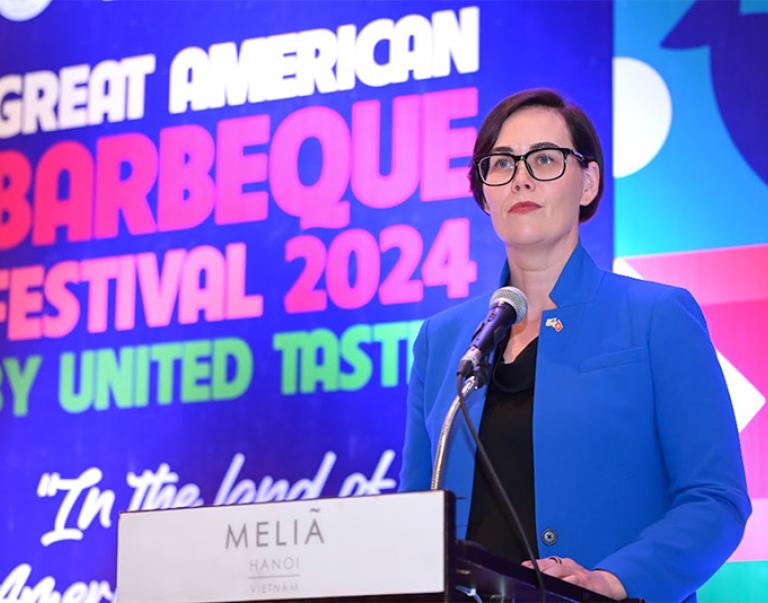ORLANDO, Fla., April 1, 2015 – At an Orlando grocery store filled with Florida citrus, Agriculture Secretary Tom Vilsack today announced the availability of $23 million in USDA funding to support research and extension projects for producers fighting citrus greening disease. Huanglongbing (HLB), commonly known as citrus greening, threatens the future viability of the citrus industry in the United States, having infected more than 75 percent of the Florida citrus crop. This funding is available through the Citrus Disease Research and Extension Program (CDRE), part of the 2014 Farm Bill.
"Citrus greening threatens citrus production in the United States and other nations," said Vilsack. "It will take continued collaboration with growers, state governments, and researchers to find viable solutions to end this harmful disease. Only long-term solutions through research will help to stop this disease that threatens the livelihoods of thousands of citrus producers and workers and billions of dollars in sales."
Since the initial detection of Huanglongbing in Florida in 2005, the disease has affected the vast majority of Florida's citrus-producing areas. HLB has also been detected in Georgia, Louisiana, South Carolina, and small areas in Texas and one residential tree in California. It has also been detected in Puerto Rico, the U.S. Virgin Islands, and 14 states in Mexico. A total of 15 states or territories are under full or partial quarantine due to the detected presence of the Asian citrus psyllid, a vector for HLB: Alabama, American Samoa, Arizona, California, Florida, Georgia, Guam, Hawaii, Louisiana, Mississippi, Northern Mariana Islands, Puerto Rico, South Carolina, Texas, and the U.S. Virgin Islands.
The CDRE grants will be administered by the National Institute of Food and Agriculture (NIFA). NIFA will give priority to projects that are multistate, multi-institutional, or trans-disciplinary and include clearly defined mechanisms to communicate results to producers. Successful applicants will be expected to engage stakeholders to ensure solutions are commercially feasible. Projects should also include an economic analysis of the costs associated with proposed solutions.
In fiscal year 2014, NIFA awarded $23 million (PDF, 414 KB) to fight citrus greening through CDRE. Examples of funded projects include a grant to the University of Florida to develop a bactericide that can be applied to infected citrus trees to reduce or eliminate pathogens, a project at Kansas State University to develop a therapeutic delivery system that will prevent Candidatus Liberibacter asiaticus from infecting plants or prevent the development of HLB in infected citrus, and a grant at the University of California-Davis that focuses on using new genetic approaches to managing the Asian citrus psyllid that causes HLB.
Pre-applications that include a Stakeholder Relevance Statement are due on June 1, 2015. Applicants who are invited to submit full applications based on an industry relevancy review of the pre-applications will be required to submit full applications by Aug. 14, 2015. See the request for applications on the NIFA website for more information.
The SCRI program addresses critical needs of the specialty crop industry by awarding grants to support research and extension activities that address key challenges of national, regional, and multi-state importance in sustaining all components of food and agriculture, including conventional and organic food production systems.
The Farm Bill builds on historic economic gains in rural America over the past six years, while achieving meaningful reform and billions of dollars in savings for taxpayers. Since enactment, USDA has made significant progress to implement each provision of this critical legislation, including providing disaster relief to farmers and ranchers; strengthening risk management tools; expanding access to rural credit; funding critical research; establishing innovative public-private conservation partnerships; developing new markets for rural-made products; and investing in infrastructure, housing and community facilities to help improve quality of life in rural America. For more information, visit www.usda.gov/farmbill.
Through federal funding and leadership for research, education and extension programs, NIFA focuses on investing in science and solving critical issues impacting people's daily lives and the nation's future. For more information, visit www.nifa.usda.gov.
#
USDA is an equal opportunity provider and employer. To file a complaint of discrimination, write to USDA, Assistant Secretary for Civil Rights, Office of the Assistant Secretary for Civil Rights, 1400 Independence Avenue, S.W., Stop 9410, Washington, DC 20250-9410, or call toll-free at (866) 632-9992 (English) or (800) 877-8339 (TDD) or (866) 377-8642 (English Federal-relay) or (800) 845-6136 (Spanish Federal-relay)



